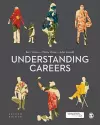
Understanding Careers
3 authors - Hardback
£167.00
Kerr Inkson (PhD University of Otago, New Zealand) is an Emeritus Professor in the University of Auckland Business School, New Zealand. His 55-year academic career included 32 years as full Professor, at five New Zealand universities. He has expertise in management, organizational behavior and career development, and his careers research includes work on new forms of career, the use of metaphor in career theory and practice, and international careers. He was first author of a paper “Expatriate assignment versus overseas experience: contrasting models of human resource development” which was awarded Best International Paper by the Academy of Management in 1997. He is a former Chair of the Careers Division, Academy of Management. Kerr has been the author or co-author of 18 books, over 50 book chapters and 75 refereed journal articles. His journal credits include Administrative Science Quarterly, British Journal of Management, Human Relations, Journal of Applied Psychology, Journal of Management Studies, Journal of Organizational Behavior, Journal of Vocational Behavior, Journal of World Business, Organizational Dynamics, and Organization Studies. His latest books are Understanding Careers, 2nd edition, co-authored with Nicky Dries and John Arnold, SAGE, 2015; Cultural Intelligence, 3rd edition, co-authored with David C Thomas, Berrett-Koehler, 2017; and Laugh out Loud: A Users’ Guide to Workplace Humor, co-authored with Barbara Plester, Palgrave Macmillan, 2018. Recently retired, he lives in Auckland with his wife Nan, plays some golf, and writes, directs and acts in plays on the local amateur drama scene. Nicky Dries is a Research Professor at the KU Leuven, Faculty of Business and Economics (Belgium). She conducted her doctoral research on talent management and (subjective) career success at the Vrije Universiteit Brussel (Belgium), during which time she was also a visiting scholar at the Vrije Universiteit Amsterdam (the Netherlands). Since then, she has been a visiting scholar at the University of Tilburg (the Netherlands), at Wirtschaftsuniversität Vienna (Austria), at Reykjavik University (Iceland), and a Fulbright scholar at Boston University School of Management (US). Nicky has published articles in international journals in the areas of career management, human resource management, and vocational psychology, and is on the editorial board of the Journal of Vocational Behavior (JVB) and the European Journal of Work and Organizational Psychology (EJWOP). Nicky′s primary research interests are talent, potential, and success - and more generally, the interplay of organizational-strategic and individual-psychological factors in shaping careers. She is actively involved in two large-scale cross-cultural projects on contemporary careers, i.e. 5C (Consortium for the Cross-Cultural Study of Contemporary Careers) and the Career Adaptability/Life Design project. John Arnold is Professor of Organisational Behaviour at Loughborough University, and a member of the School’s Research Centre for Professional Work and Society. From 2011 to 2013 he was head of the Institute of Work Psychology (IWP), at the University of Sheffield, and prior to that had extensive experience at Loughborough University Business School (15 years), and Manchester University School of Management (8 years). John is a Fellow and Chartered Psychologist of the British Psychological Society, and a Registered Psychologist. He was editor of Journal of Occupational and Organizational Psychology (JOOP) from 2004 to 2008, and is currently a consulting editor with JOOP, Journal of Vocational Behavior, Human Relations, and Organizational Psychology Review. He has been Principal or Co-investigator on 21 externally funded research projects and has published over 70 refereed journal articles. John is author or co-author of a number of books including Managing Careers into the Twenty-first Century (1997), and lead author for the first five editions of the textbook Work Psychology. He was a member of the Business and Management panel in the UK’s 2008 Research Assessment Exercise, and is repeating that role in the 2014 Research Excellence Framework process.